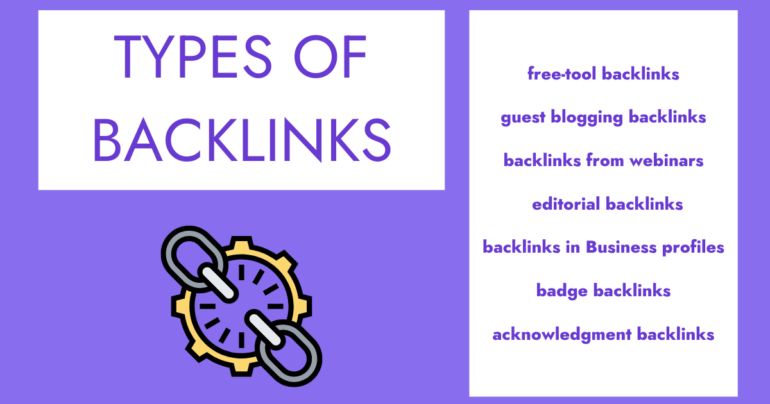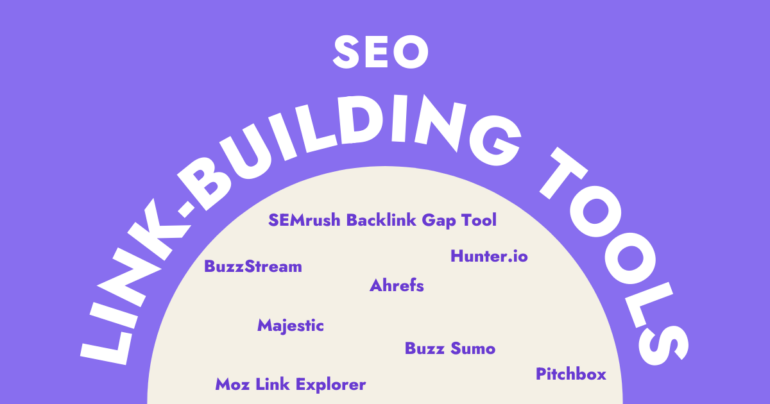Link building is essential for driving organic traffic and establishing authority and trust. No matter if you are new to digital marketing and SEO or already have some experience, link building should always be at the top of your list of strategic actions for better search engine rankings. Sometimes, even when you create relevant content for your target audience, answer frequently asked questions, provide industry updates, and optimize your content for SEO, you still don’t outrank your competitors. Why?
Because you don’t build authority.
Wondering how to do that? You should start by earning links from authoritative websites and building a strong brand. Not sure how? The title of this article should say it all: Through link building.
This is the ultimate beginner’s guide to link building in 2022, let’s dive in!
What is Link Building?
Link building is the process of getting links for your website from other websites. The links that you get are hyperlinks which are called backlinks. It’s already well known that hyperlinks are a wonderful way for users to navigate through pages and be led to the content they are searching for.
There are so many techniques for effective link building, however, in general, a lot of SEO experts will agree that it is one of the hardest and even most time-consuming parts of their job. Keep in mind though, that not every link is good for your ranking and you need to receive high-quality links instead of focusing on quantity. The quality and authority of any backlink are essential for your content, and all the links should be related to your industry or niche to be considered valuable.
When you use your blog to build links, you implement a white hat link-building technique, which is the process of increasing website traffic, rankings, and visibility organically.

Link Building Benefits
Now, it’s time to talk about some link-building benefits.
When it comes to ranking your website or content, links are essential components for search engines. If you want to run a successful SEO campaign, you cannot neglect the importance of link building. Here are a few of the most common benefits:
- Getting authority: If you’re new in the industry and produce high-quality content, you need to acquire links to get authority. Getting backlinks from a trustworthy and authoritative website can help search engines, such as Google, consider your website as more authoritative. Link building is a great opportunity to establish a trusted and authoritative brand. Readers love to read content that has quality, and when you receive quality links from trustworthy websites, you build credibility. With strategic content and link building, you will be considered an expert in your industry and get higher rankings on Google.
- Building relationships: Link building opens up a space for you for a new collaboration and builds strong relationships not only with search engines but also with some important companies and brands in your industry that value your content. So, you also build long-term relationships with other companies, blogs, and websites in the same niche. Whenever you promote your content or new products, you get a backlink, which means that you establish connections and become a highly trusted company.
- Increasing sales: Whenever traffic comes to your website from a linking website, you get referral traffic. Through referral traffic, you reach new audiences and increase conversion rates, sales, and meanwhile your revenue.
Link Types
Before speaking about the link-building best practices, let’s speak about its common types:
- Nofollow links — These links don’t pass on link juice and tell a search engine to ignore the links.
- Dofollow links —These links inform Google that you are a trusted source and they improve your ranking.
- Backlinks — These are links that you get from websites that link back to you.
- Broken links — These links point to an end source which has been removed or is not live anymore.
- Editorial links — These are backlinks you get organically from an editorial source.
- Internal links — These are links to a page on your website that link to another page on your website.
- External links — These are links that you put when you want to link to another domain or website.
Here are the different types of backlinks in SEO:

How to create backlinks for free?
If you are wondering how to get backlinks to your website, you can try these methods out:
- Use HARO, which is a great platform, to give answers to journalists’ questions who are likely to include your website backlink when using your answer in their blogs.
- Find broken links and ask website owners to link to your page that is relevant to the topic.
- Interview influencers in your niche.
- Create graphics and be active on social media.
You’ll find more details in a minute!
Link Building Tips
Here are SEO link-building strategies that can help you with link building:
Create Visual And Linkable Assets
Linkable assets refer to pieces of content that are more likely to receive backlinks. Through these visual assets, you will improve brand awareness and reach new customers as people are 30 times more likely to view an infographic rather than read a complete article. So, whenever you create a chart, infographic, or any other visual asset, your chances of gaining more links increase. You can get many links from authoritative websites as when they publish your visual assets on their blog or website, they give a link back to you.
Provide Testimonials
Not only does the company benefit but also you take advantage whenever you give a testimonial. This way, you provide a positive review by talking about your experience when using products from another company. The company establishes trust and you get an opportunity to receive a backlink to your website through this method.
Here are some tips you can consider using:
- Find the website of the products that you use. It should be relevant to your niche and have a section for testimonials.
- Contact the right person once you choose a website. Don’t think of only one website, instead choose multiple to have a list of email addresses to contact each one of them.
- Create a testimonial pitch by introducing yourself, showing how they’ve helped you, and including all necessary information.

Do Guest Blogging
Guest posts provide much more than a backlink. When you land a guest post on a website your target audience frequents, they can drive qualified traffic your way. Consider the following tips for guest blogging:
- Find sites that accept guest blog posts and choose the websites carefully as they need to be relevant to your niche.
- Get the editor’s contact info.
- Brainstorm a relevant topic for them and choose the ones that will be interesting for the website audience and have not been covered before.
- Pitch it persuasively.
- Focus on bringing value and quality, instead of sales.
- Write the post and receive a link back to your website.
Digi-Tips: Don’t send your guest posts to several blogs as blog editors want to see original and unique topics.
Create Shareworthy Content
One of the best link-building techniques is creating valuable content to get more shares and receive backlinks. With that in mind follow these steps:
- Include the proper amount of lists: neither too few, nor too many. One or two lists per 500 words increase organic traffic by 68% compared to articles without lists. Listicles make the content easier to digest. For instance, blogs like 5 ways to boost link building or 10 ways to get the most out of your SEO services are good working titles.
- Publish detailed guides as the study done by Semrush shows that articles that have 7000+ words are more likely to get backlinks. Guide titles draw three times more organic traffic, and how-to titles perform 1.5 times better. Compared to articles of average length (900-1200 words), short posts (300–900 words) receive 75% fewer backlinks and 21% fewer visitors.
- Conduct interviews as an interviewee is more likely to share a quote you publish from them with their audience. You can attract viewers and receive backlinks if they discuss it on their own websites or social media accounts.
Digi-tip: The upper body of your article is the ideal location for links as readers first look at the top page when they land on your website.
If you have already written blogs and shared advice on your small business website, then are you doing anything else to promote that content, besides the obligatory share on social media? There are a lot of popular online blogs that allow you to syndicate your content (like Medium, Scoop.it, and others). Write a compelling summary for your blog, rewrite it, and post a link back to your website.
Also, you can share links to your content on social sharing sites and online forum boards like Quora and Slideshare. Try to do this regularly and you’ll build a name for yourself as an authority in the space. Users on these sites may start to follow you specifically to see your answers. That drives traffic.
Connect with Local and Niche Bloggers
Discover well-known bloggers who cover your location or industry. These types of content creators are driving constant content for their readers. So, sometimes when they run out of ideas, be the one that gives them a topic to tell about.
At first, comment or reshare their posts when you find them interesting, so you can build a genuine relationship. During that, pay attention to what they post about, and review where it might make sense for them to involve you. If you’re a wine seller, you might ask to tell about wine history and share some wine-drinking tips.
The key here is to share something valuable for their readers. As a small business, you’ll have better luck going after smaller bloggers. These micro-influencers may not have the domain authority of a celebrity blogger, but their niche focus makes their backlinks highly recommended for your website.

Consider Broken Link Building
Links may get broken or lost over time, as authors sometimes remove links by chance when they post them on their blogs. With that in mind, find broken links and reach out to webmasters to ask to replace the broken links with a link to your relevant resources. Also, try to reclaim your own broken links otherwise your competitors will use them against you.
Reclaim Unlinked Mentions
This is perhaps the easiest link-building tactic of all. Both big and small brands are mentioned every day online․
You can set up free Google Alerts for “[your brand name]” and “[yourdomain.com]”, as well as the names of any prominent members of your leadership team. Whenever a website mentions you without including a link, reach out. You can find this kind of information from a brand monitoring tool provided by Semrush.
In this case, we have a friendly audience who already thought you were worth mentioning to their readers. It’s normal for them to include a link to your site, so their visitors can learn more about you.
Check every mention before you reach out. In case a site mentions your business not in a positive way, do not ask them for a link.
Appear in Directories
It’s a good idea to use niche directories as it is easier to get indexed in the leading search engines and easier for people to locate you online when your company is listed in such directories. By listing your company in high-authority directories, you can improve your rankings, build backlinks, and reach a new audience.
SEO Link-building Tools
And here are some SEO link-building tools that you can use:

Digilite can help you navigate your way around. We have years of experience in SEO and our experts are professionals in creating and implementing strategic link-building plans. Need SEO services for your website? Contact our marketing team for more!

![The Beginner’s Guide to Link Building [Updated 2022]](https://digilite.ca/wp-content/uploads/2020/06/Link-Featured.png)


